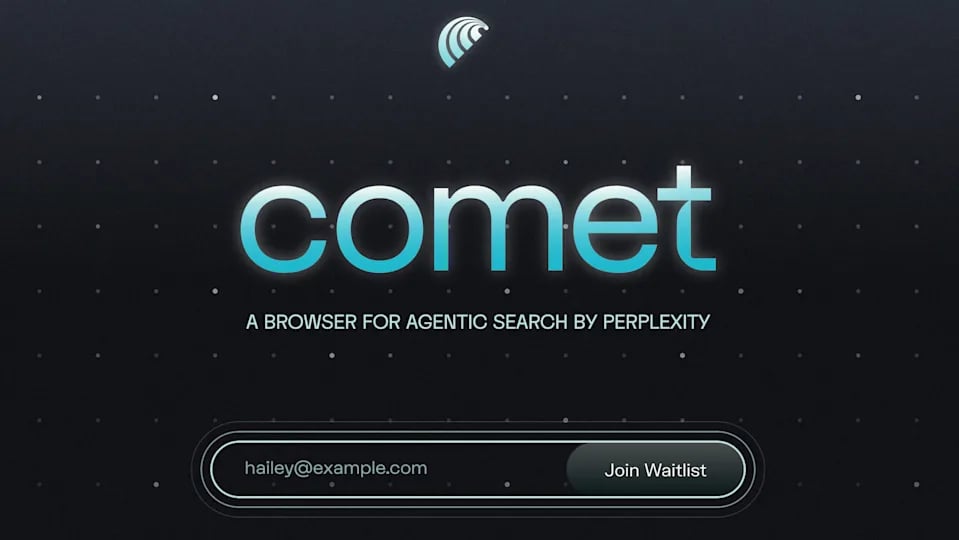Perplexity's AI-powered browser opens up to select Windows users
Perplexity plans to launch its AI-powered Comet browser on Windows and Android, emphasizing user privacy with optional targeted ads, amid competition from Opera, Google, and OpenAI.
ARTIFICIAL INTELLIGENCETECHNOLOGY
Eric Sanders
6/23/20253 min read


Perplexity’s Comet Browser: A New Era of AI-Powered Browsing with Privacy at Its Core
As the internet landscape evolves, the fusion of artificial intelligence and web browsing becomes inevitable. Perplexity’s upcoming launch of the AI-powered Comet browser marks a significant milestone in this evolution, positioning itself as a privacy-focused alternative in a market dominated by industry giants like Google, Opera, and OpenAI. This development isn’t just about faster searches or smarter interfaces, it’s about redefining how users interact with the web while maintaining control over their data.
Breaking Into the Browser Market: The Promise of Comet
Navigating the crowded browser market, Perplexity’s Comet aims to stand out by harnessing AI capabilities combined with a user-first privacy approach. The browser is set to debut first on Windows and Android platforms, reflecting the company’s commitment to reaching a broad audience across desktop and mobile environments.
What distinguishes Comet from competitors is its optional integration of targeted advertisements. Unlike other browsers that routinely embed ads, Comet gives users control over whether they want to see personalized ads based on their browsing habits. This feature heralds a shift toward transparency and user agency in an arena often criticized for exploitative data practices.
Personal Reflections on AI and Privacy in Browsers
As someone who has witnessed the evolution of web browsers, from simple tools to complex platforms inundated with ads and tracking scripts, I find Comet’s approach refreshing. Browsers have quietly become a battleground for privacy, often sacrificing it for convenience or revenue. The promise of an AI-powered tool that both enhances the browsing experience and respects user privacy resonates deeply in a digital age marked by growing concerns around data misuse.
I remember struggling with browsers that relentlessly pushed targeted ads, leaving me feeling monitored rather than aided. Comet’s model, where targeted ads are optional, flips this narrative. It respects the user’s choice, effectively balancing innovation with ethical considerations. This is particularly important as AI becomes more embedded in our daily tech interactions, offering assistance without overstepping personal boundaries.
What Comet’s Launch Means for Users and the Industry
The arrival of Comet is not just an isolated product launch; it signals a critical juncture in how AI-powered tools can be integrated into everyday applications without compromising privacy.
Key takeaways from Comet’s approach include:
User Privacy First: Comet puts data privacy at the forefront, allowing users to opt-in rather than imposing targeted ads by default. This model empowers users to maintain control over their data.
AI-Powered Assistance: The browser leverages AI to enhance user experience, potentially speeding up search results, summarizing complex information, and facilitating more natural web interactions.
Cross-Platform Accessibility: By focusing on Windows and Android initially, Comet ensures it targets a wide user base, acknowledging the importance of both desktop and mobile environments.
Competition Driving Innovation: The presence of competitors like Google and Opera pushes Comet to innovate uniquely, particularly in privacy and user empowerment.
For users, this means a potential shift toward browsers that don’t just passively display information but actively assist users in managing and consuming online content intelligently and ethically.
Lessons from Comet: How Privacy and AI Can Coexist
From Perplexity’s bold move, there are valuable lessons for both users and developers of AI-based technology:
Transparency Builds Trust: Being upfront about data usage and giving users choice creates confidence, which is crucial for adoption in privacy-sensitive markets.
Customization Matters: Allowing users to tailor their experience, notably with ad settings, engages them as active participants rather than passive consumers.
Ethical AI Deployment: Integrating AI in applications, especially those that touch personal data, must come with ethical guardrails and respect for user autonomy.
Cross-Device Consistency: Users expect seamless experiences whether on mobile or desktop, so AI tools must be adaptable across platforms.
These principles are not only relevant for browsers but also apply broadly to emerging AI technologies, balancing power with responsibility.
Who Will Truly Own Our Browsing Experience?
As Comet prepares to open its doors to a select group of Windows users and soon expand further, the question remains: how will consumers respond to a browser that champions privacy alongside AI innovation? In a world where every click can be tracked and monetized, what does it mean to truly have agency over one’s browsing data? As users, where should we draw the line between convenience and control?
The Comet browser challenges us to rethink the relationship between technology and privacy. Will this new approach inspire other browsers to follow suit, or will the giants of the industry continue to dictate how much of ourselves we trade for a streamlined experience?
In the end, who will decide the future of AI-powered browsers, and how they impact our digital lives?
Efficiency
Transform your workflows and reclaim your time.
Contact Us
Need A Custom Solutions? Lets connect!
eric.sanders@thedigiadvantagepro.com
772-228-1085
© 2025. All rights reserved.
